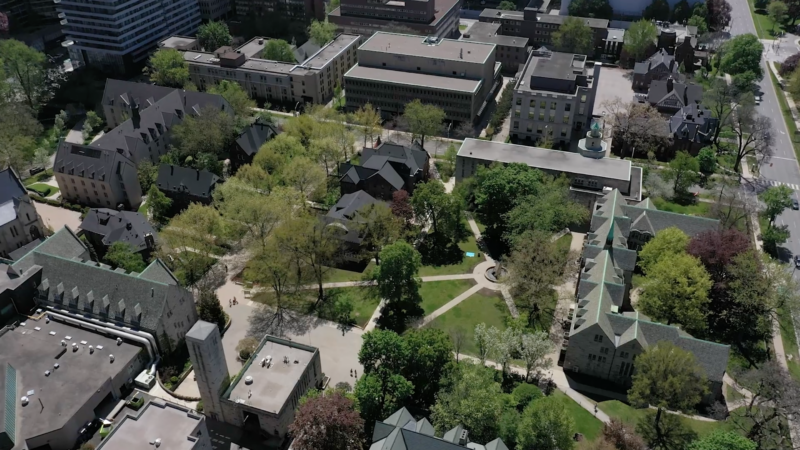The University of St. Michael’s College is celebrating the news that our Chancellor, Archbishop Francis Leo, is to be elevated to the College of Cardinals later this year.
“Archbishop Leo has been a valuable source of guidance and support to the university and to me,” says St. Michael’s President David Sylvester. “We look forward to witnessing his service extend from St. Michael’s and the Archdiocese of Toronto to the global Church from Rome.”
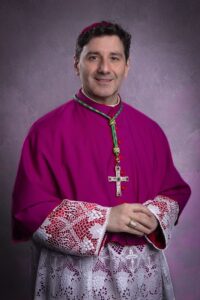
A consistory – a meeting of the College of Cardinals – for the creation of new cardinals will take place Dec. 8, 2024 in Rome at the Vatican. Archbishop Leo is one of 21 men from around the world to named as a cardinal.
“I am humbled and honoured to receive this appointment from the Holy Father. I pray and rely on the prayers of the faithful in Toronto that I will be a worthy servant of the Lord Jesus in fulfilling my responsibilities as a member of the College of Cardinals and to continue in my primary role as shepherd of the faithful of the Archdiocese of Toronto,” the archbishop said in a statement released by the Archdiocese of Toronto to announce the appointment.
Leo, an accomplished academic who has served in a variety of roles within the Roman Catholic Church in Canada, the United States and Australia, was sworn in as Chancellor of St. Michael’s in June 2023.
As stated in the University of St. Michael’s College Act (2005), the Chancellor, who is also a member of St. Michael’s Senate, presides at university convocations and confers degrees. Archbishop Leo’s appointment was made by the University’s Collegium, St. Michael’s governing board of directors.
Prior to being named Archbishop of Toronto, Archbishop Leo served as Auxiliary Bishop of Montreal. A respected academic who speaks English, French, Italian, and Spanish, Archbishop Leo has taught philosophy and theology and served as a Judge for the Canadian Appeal Tribunal. He is President and founding member of the Canadian Mariological Society. He is a Knight of the Holy Sepulchre of Jerusalem as well as a member of the Priestly Fraternity of St. Dominic (Third Order Dominican).
Leo will preside over the Faculty of Theology convocation on November 9, 2024.
The University of St. Michael’s College is pleased to welcome Susan Helstab as Chair of Collegium, the University’s highest governing body. Current board member Helstab, an experienced business leader with extensive teaching and volunteer experience, was elected to the role in December, 2023.
Joining Helstab on the board’s executive team as Vice-Chair is current Collegium member Dr. Mike DeGagné.

Reflecting on her election to the role of Chair, Helstab says “as an alumna of the University and former resident of Loretto College, I am deeply honoured by the opportunity to give back in a meaningful way to the school that set me on the path to success in life and helped solidify my personal values in adulthood.”
Helstab’s more than 40-year career in business was capped by serving as EVP Global Sales and Marketing of Four Seasons Hotels and Resorts. Possessing a life-long interest in supporting higher education, she taught advertising in the Radio Television Arts program at Toronto Metropolitan University in the 1980s, as well as serving on advisory boards of both Cornell University (2009-2015) and Toronto Metropolitan University (2019-2022), and as a guest lecturer at Harvard (2013-2015). Her volunteer experience also includes time on the board of the Sunnybrook Hospital Foundation.
“St. Mike’s has an inspiring strategic plan. We have a visionary President. We have dedicated Collegium members,” Helstab says. “As Collegium Chair, I will apply my leadership, business, and brand-building experience to ensure continued effective governance and to support the President in the achievement of the St. Mike’s 180 Strategic Plan.”

DeGagné is the President & CEO of Indspire, an Indigenous national charity dedicated to supporting and investing in the education of First Nations, Inuit, and Métis people throughout Turtle Island. A former President and Vice Chancellor of Nipissing University, his volunteer experience includes serving as Chairman of Ottawa’s Queensway Carleton Hospital and Chairman of the Child Welfare League of Canada. He has received the Order of Canada, Order of Ontario, and the Queen’s Diamond Jubilee Medal. A Professor of Sociology at the University of Toronto Scarborough, he is a citizen of the Animakee Wa Zhing 37 First Nation.
“I welcome the opportunity to serve St. Michael’s as Vice-Chair of the Collegium,” says DeGagné. “I have extensive experience in higher education and in university administration. It will be a pleasure to be more involved in Catholic education.”
University President David Sylvester said he looks forward to working with Helstab and DeGagné in their new roles.
“Susan Helstab and Dr. DeGagné each have brought enormous governance as well as public and private sector experience to the Collegium. As Chair and Vice-chair, their leadership will help ensure our commitment to serve students in ways that are academically and socially transformative,” says Sylvester.
At its Fourth Regular Meeting on June 12th, the Collegium passed a motion with unanimous support formally thanking outgoing Chair Rosanne Rocchi for her years of service to the University of St. Michael’s College and the Collegium.
The Collegium governs the affairs of the University. It safeguards the property and funds of the University, ensuring that it has the resources to carry out its mission while operating in accordance with the best academic practices and the governing law. The Senate is the principal advisor of the Collegium on all matters of an academic and educational nature in the University.
The University of St. Michael’s College is pleased to welcome Dr. Brendan Browne and Dr. Mike DeGagné to the Collegium, the University’s governing board.
Dr. Browne currently serves as Director and CEO of the Toronto Catholic District School Board (TCDSB), while Dr. DeGagné is the President and CEO of Indspire, the national organization which supports Indigenous post- secondary students and recognizes Indigenous excellence through the annual INDSPIRE awards.
“Dr. Browne and Dr. DeGagné bring exceptional governance and educational experience to Collegium and will help St. Mike’s advance two strategic priorities: how the University can engage fruitfully in the journey of Reconciliation and how best to leverage our position as a leader in Catholic education to serve teachers, school administrators and the community,” President David Sylvester said.
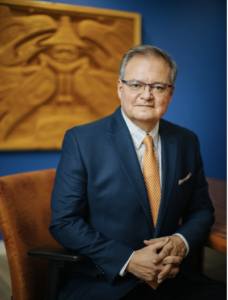
An Ojibway from the Animakee Wa Zhing 37 First Nation, Dr. DeGagné served for seven years as President & Vice Chancellor of Nipissing University in North Bay, Ontario and in 2020 he became the first President & Vice Chancellor of Yukon University in Whitehorse. His more than 25 years’ experience in public service includes serving as an executive with Health Canada as well as with Indian and Northern Affairs Canada.
In 1998, Dr. DeGagné became the founding Executive Director of the Aboriginal Healing Foundation, working on a national level to encourage and support community-developed and delivered culturally based initiatives addressing the intergenerational effects of abuses suffered in the Indian Residential School System. The recipient of numerous awards and honours, he was appointed a Member of the Order of Canada in 2014 and Member of the Order of Ontario in 2010. He was made a Visiting Fellow at St. Michael’s College in 2021 and is a member of the advisory council for St. Michael’s Diploma in Social Responsibility & Sustainability program.
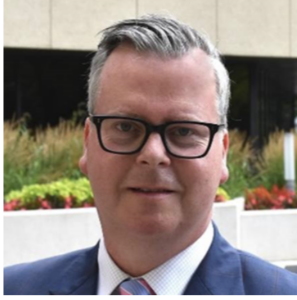
The 14th Director of Education for the TCDSB, Dr. Browne has served as a teacher, vice principal, principal, superintendent and executive superintendent. He has written extensively on matters relating to education, including creating Catholic leadership course modules, and is the author of Leading for Educational Lives: Inviting and Sustaining Imaginative Acts of Hope in a Connected World.
He has served on numerous provincial and international committees and boards focused on educational leadership, including his current position on the provincial committee for school mental health, and internationally on the Board of Directors for a Christian mission hospital in Kenya.
In 2022, Dr. Browne received the Distinguished Alumni Award from Brock University, where he earned his doctorate in Leadership and Policy Studies.
“It is an honour to welcome Drs. DeGagné and Browne to Collegium. Their respective skill sets will further enrich a very talented and dedicated board,” said Collegium Chair Rosanne Rocchi.
Dr. Browne and Dr. DeGagné take up their new role as of the October 11th Collegium meeting.
Collegium is the principal of two bodies that govern the affairs of the University of St. Michael’s College. Its members work to safeguard the property and funds of the University and ensure that it has the resources to carry out its mission while operating in accordance with the best academic practices and the governing law.
Senate is the other governing body. Its responsibilities concern academic matters and it has the exclusive power to grant degrees and award diplomas and certificates within the University. Senate also advises the Collegium on all academic and educational matters.
On June 14, 2023, the Collegium of the University of St. Michael’s College committed to fully divest the University’s investments from fossil fuels by the year 2030, or sooner if possible.
The University of St. Michael’s College (USMC) has held no direct investments in fossil fuel companies since 2013, and the Collegium’s decision will complete the process of removing fossil fuel companies from its indirect investments (pooled and commingled funds).
Complete divestment from fossil fuels builds on USMC’s established initiative of investing according to its institutional values. Since 2016 USMC has collaborated with the Shareholder Association for Research & Education (SHARE) to support and encourage more just and humane environmental, social, and governance practices among investees. In 2021, USMC joined a coalition of Canadian universities to launch SHARE’s University Network for Investor Engagement (UNIE), which engages corporations on climate change risks.
“The Collegium’s commitment to full divestment from fossil fuels represents an important next step on a journey this university has been on for over thirty years,” said President David Sylvester. “St. Michael’s has been a forum of ecological thought and practice since the founding of our Elliott Allen Institute of Theology and Ecology in 1991. The Collegium’s decision resonates powerfully with that tradition, and with our university’s vision to be a recognized leader in promoting respectful dialogue and action to advance the care of our common home, as articulated in our strategic plan, St. Mike’s 180.”
Learn more about St. Mike’s sustainability initiatives.
The Collegium of the University of St. Michael’s College is pleased to announce that Dr. David Sylvester has accepted a second term as the University’s 8th President and Vice-Chancellor. The appointment, effective July 1, 2023, marks Dr. Sylvester’s 6th term as a university/college president, and his 24th year in senior administration since being appointed the Founding President of Corpus Christi College in Vancouver in 1999.
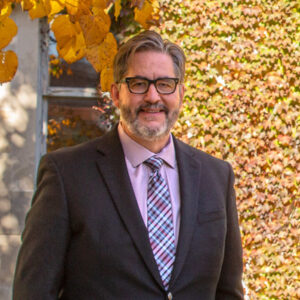
One of Canada’s most experienced leaders in Catholic higher education, Dr. Sylvester has also served as Principal of St. Mark’s College at the University of British Columbia and as Principal of King’s University College at Western University.
Among his many accomplishments during his first term, Dr. Sylvester oversaw the federation of Regis College and St. Michael’s Faculty of Theology, creating a groundbreaking new theologate. He also worked with the Loretto Sisters to assume the responsibilities of the historic Loretto College women’s residence.
“We are delighted that David Sylvester has agreed to serve another term as President,” says Rosanne Rocchi, who is Chair of Collegium, the University’s governing board of directors. “David initiated an important mission with St. Mike’s 180 (strategic plan). We are pleased that he will be able to continue realizing that vision and shepherding the many other initiatives he has stewarded to establish and continue USMC as an educational leader.”
The reappointment process began in 2021, when Collegium delegated authority to the Executive Committee to design and oversee the presidential review process prior to reappointment. The ensuing process included consultations with stakeholders both across the university and beyond. The overwhelmingly positive feedback led to a unanimous motion passed by Collegium to reappoint Dr. Sylvester to a second term.
“I am honoured to serve St. Michael’s as it continues on a path of revitalization and a recommitment to its historic mission to lead for change. The ambitious strategic initiatives conceived by this remarkable community inspire me in my work,” President Sylvester says.
“I am especially grateful to the leadership and support provided by our governing Collegium members; their critical engagement and support of our students, faculty, staff, and alumni exemplify the best in university governance in this country. It is a true privilege and a source of pride to work here, and I look forward to working with my colleagues as we continue to live into our commitment to be Canada’s leading Catholic university,” he adds.
“David Sylvester’s re-appointment is an important step towards the ambitious goals of St. Mike’s 180 strategic plan,” says Paul Harris, who served as Chair of the Collegium when the process began. “David’s approach as President has resonated with students, faculty, and the administration. He has built a strong team around him, which will help St. Mike’s become the premier Catholic university in North America. David has built an inclusive community at St. Mike’s that treats everyone with dignity and respect and creates an environment for our students to be successful during their studies and after graduation.”
The Executive Committee continues to support Dr. Sylvester as he establishes ambitious goals for this second term.
“During the pandemic, this community responded compassionately and creatively as a source of hope for our immediate community. Our task now is to look beyond our campus to take up the responsibilities that face our graduates, our society, and our Church. St. Mike’s is committed to engaging in these new challenges and unleashing the limitless resources of our people to build up the common good,” Dr. Sylvester says.
Dr. Sylvester is a social economic historian whose area of research focuses on the nature of community in the Middle Ages. He is appointed Full Professor, Teaching Stream, in the Mediaeval Studies program in St. Michael’s College, is an Associate Fellow and Board Member at the Pontifical Institute of Medieval Studies, and holds a status appointment in the University of Toronto’s Centre for Medieval Studies.
He has an M.A. and a Ph.D. in mediaeval history from Fordham University, New York City, has taught in the departments of history at the University of British Columbia, Corpus Christi College, and Fordham University, and was a tenured associate professor in the department of history at King’s. He has served as the Chair of the Governance Committee of Universities Canada and as a member of the boards of the Canadian Federation for the Humanities and Social Sciences and the Boston College Institute for Administrators in Catholic Higher Education. He is the past Chair of the Association of Catholic Colleges and Universities of Canada.
Dr. Sylvester and his partner of thirty years, Dr. Allyson Larkin, Department Chair and Associate Professor of Social Justice and Peace Studies at King’s, have four children.
“David’s enthusiasm for leading USMC in a respectful and collegial manner has been a singular factor in making our campus an open and welcoming environment, building on our Catholic traditions and equipping our students to look forward with confidence to face the challenges of the future,” Rocchi says. “We are fortunate to have his leadership.”
On March 17, 2023, University of St. Michael’s College President David Sylvester and Collegium Chair Rosanne Rocchi welcomed Archbishop-Designate Francis Leo and Cardinal Thomas Collins to campus.
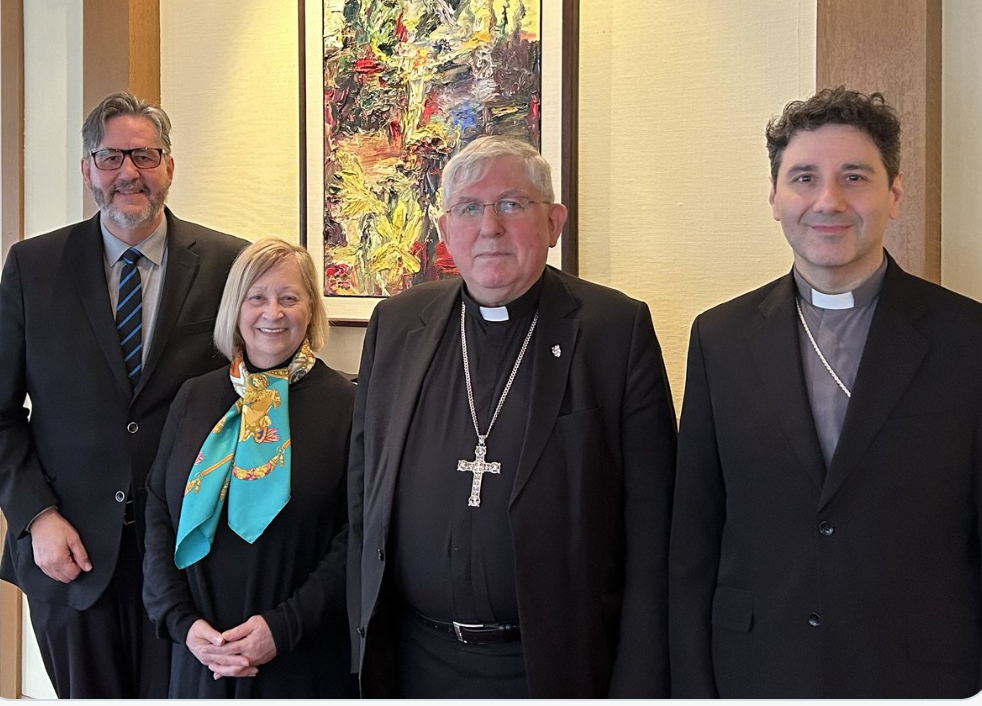
USMC Chancellor Cardinal Collins, and Frank Leo, the newly appointed Archbishop of Toronto
Leo will be installed as the next Archbishop of Toronto during a special Mass and ceremony at St. Michael’s Cathedral Basilica in downtown Toronto. The ceremony will be live-streamed, details will be posted on the Archdiocese of Toronto website: https://www.archtoronto.org/.
Fr. Don McLeod is a Basilian priest, an alumnus of USMC (College and Faculty of Theology) and a member of the Collegium since September 2013, serving as Chair from 2017 until the present. He has a particular interest in institutional governance and in ensuring that the proper role of the Collegium in University governance is clearly outlined. He has taught and been an administrator at both the high school and university levels, most recently at St. Joseph’s College in the University of Alberta. He continues to exercise his passions for aviation and cycling, Catholic Social Teaching and the study of Scripture and Biblical languages, while residing with the Basilian Fathers of Presentation Manor in Scarborough.
“Piloting” USMC
Two or three weeks ago, someone asked me if serving as Chair of the Collegium was burdensome, especially during the current COVID-19 crisis. After a few moments’ reflection, I replied that although Collegium had recently had to confront some very challenging issues, I would not describe my role as “burdensome.” To the contrary, the past four-plus months have been challenging but not burdensome.
To help clarify, permit me to draw an analogy with aviation. When people learn that I am a licensed pilot, they often ask if I fly solo—to which my usual response is “yes and no.” “Yes,” if that means that I am the only person in the aircraft. “No,” if the implication is that no one else is involved in a flight. Although it sounds counter-intuitive, even if the pilot is the only one aboard the airplane, there is no such thing as “solo.”
Most people who fly commercially know that a safe and successful flight requires professional pilots “up front,” equally competent and professional flight attendants in the cabin and good ground crew—and that is certainly true. However, there is much more to aviation than that.
First, even a small aircraft comes with a very detailed Pilot’s Operating Handbook—in the case of the Cessna 172, the aircraft I fly, nearly 200 pages of very dense information. Included in this are several checklists covering nearly every conceivable situation, from before engine start through to shutdown—and the pilot who ignores or omits even parts of these does so at his or her own risk. These documents reflect literally thousands of person-hours of designing, building and testing, without which no aircraft ever makes it to the flight line, let alone into the air.
Further, behind the scenes of any safe flight are the people who service the aircraft and keep it airworthy. This includes mechanics, dispatchers, fuelers, cleaners and airworthiness inspectors—all of whom are required to ensure that the aircraft is indeed safe to fly.
Most of my compatriots fly out of and into what in Canada are known as certified aerodromes—airports, for short. These facilities require ongoing maintenance to ensure that taxiways and runways are safe and clear of any debris, including snow and ice in winter, that pavement markings including runway numbers are clearly visible and that all ground signage is accurate. Much of this work goes unnoticed but is essential to safe operation—and is regularly inspected.
Once the aircraft is ready, the airport safe to fly out of, the pilot (and maybe passengers) belted in and the engine started, the pilot is still dependent on many people to ensure a safe flight. If the airport has traffic controllers the pilot must obtain clearance both to taxi and to take off and must rely on the men and women at the other end of the radio waves to ensure safe separation of all aircraft. Even at an uncontrolled airport, the pilot must rely on other pilots and even people on the ground to advise of their positions and intentions. The same is true, in reverse order, when preparing to land.
In short, from long before engine start to after shutdown, safe and enjoyable flying is dependent on the skills, attentiveness and commitment of a significant number of people filling a wide range of roles—the pilot is one of these people, undoubtedly an essential cog in the machinery, but far from being the only one. In other words, the pilot in reality is never “solo.”
To return to my analogy, one could suggest that the Collegium, and in particular the Chair, might be viewed as the pilot who is charged with ensuring that the University is able to fulfill its mission. However, just as with the pilot of an aircraft, a successful “flight” of the University is dependent on the commitment, dedication and competence of many more persons than the relatively few that a casual observer might see seated at the Collegium table.
This has been even more apparent to me as we have dealt with the impact of the COVID-19 pandemic. From the very beginning, every member of the USMC community, regardless of their particular role, has given more than generously of their time and talent to ensure that we “fly” successfully through this unprecedented turbulence. I may by analogy be one of the “pilots” for this adventure but am well aware of the enormous debt of gratitude my colleagues and I owe to so many who have contributed to our safe and level “flight.” To them I say simply, “Thank you!”
Read other InsightOut posts.

